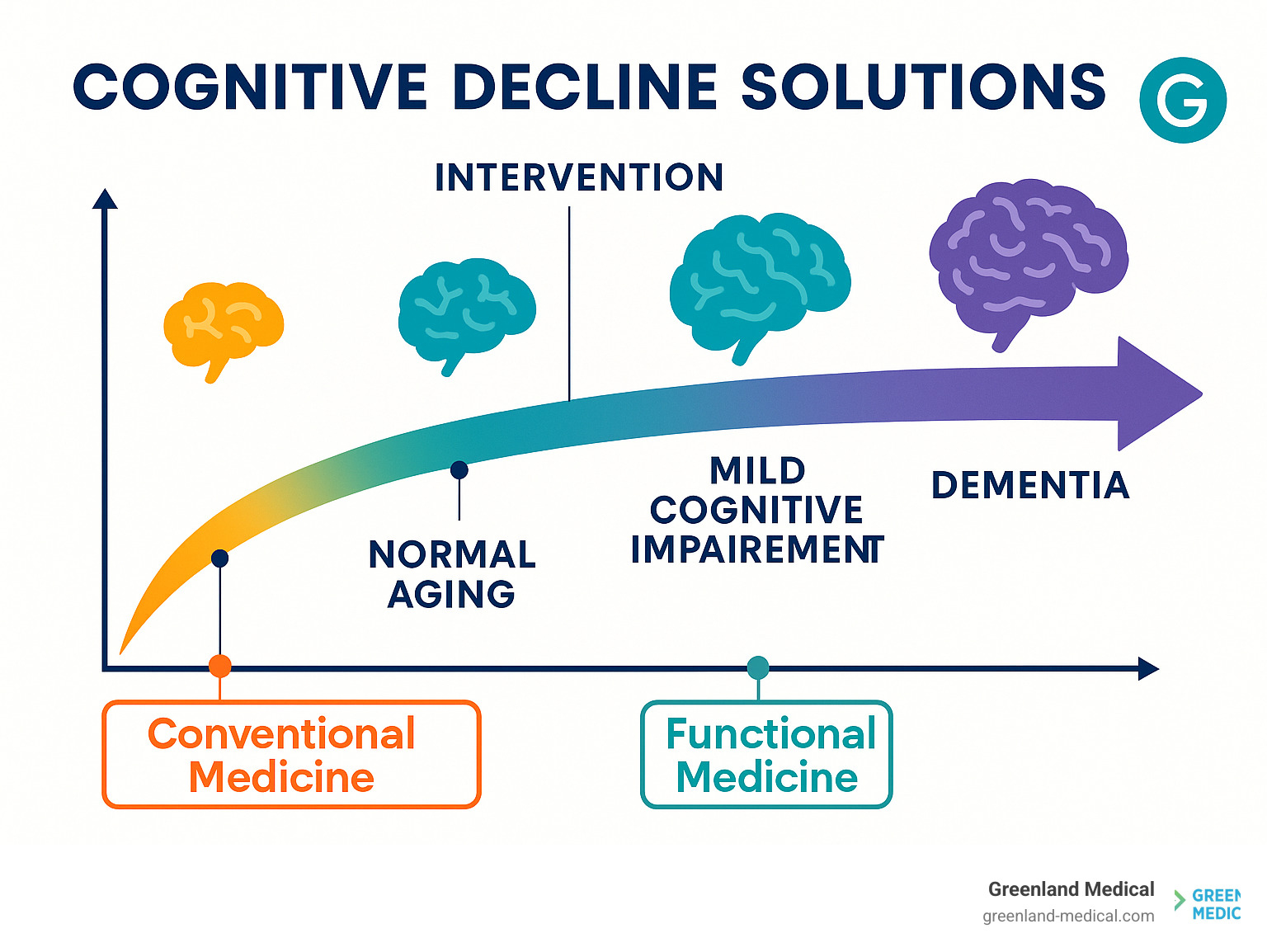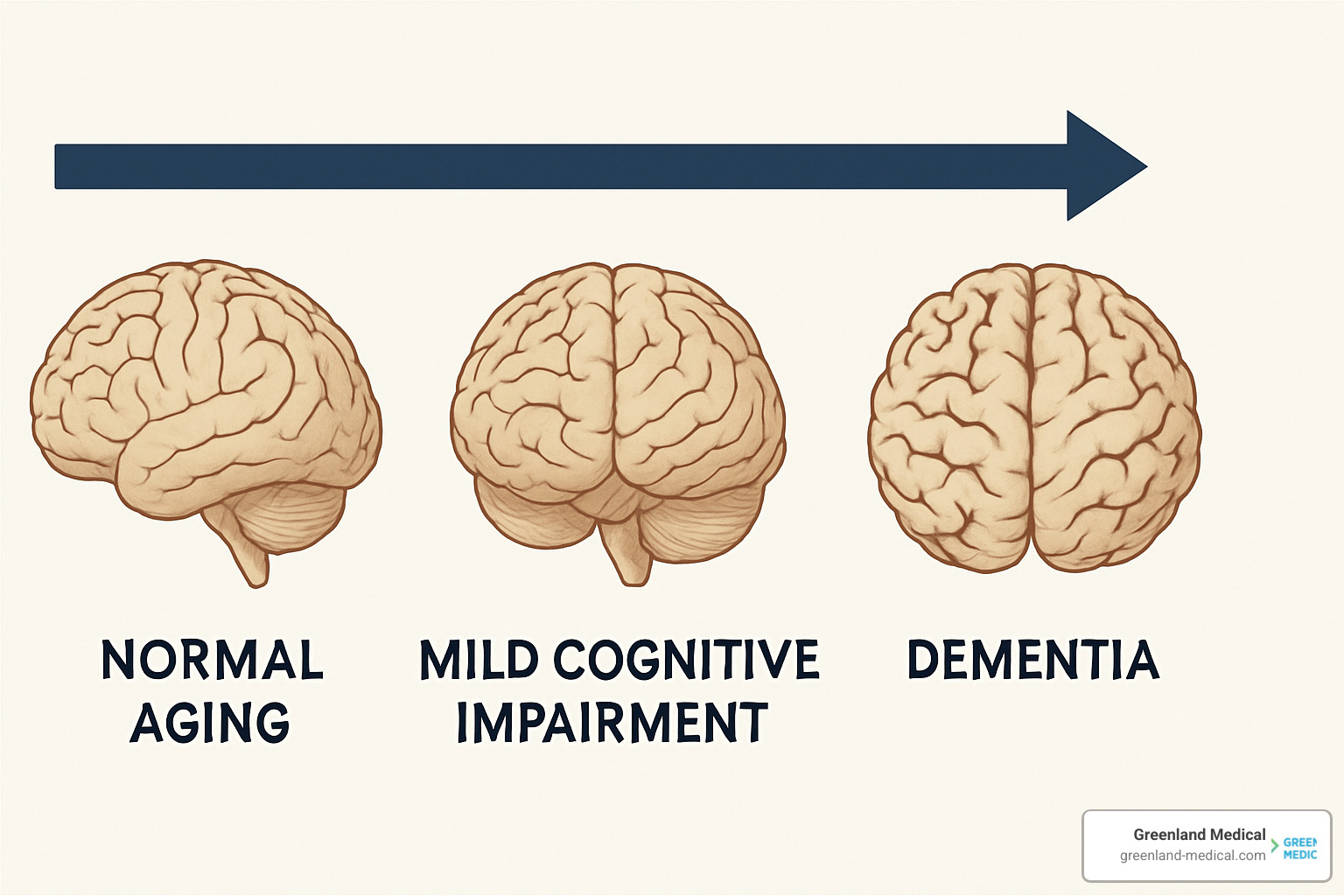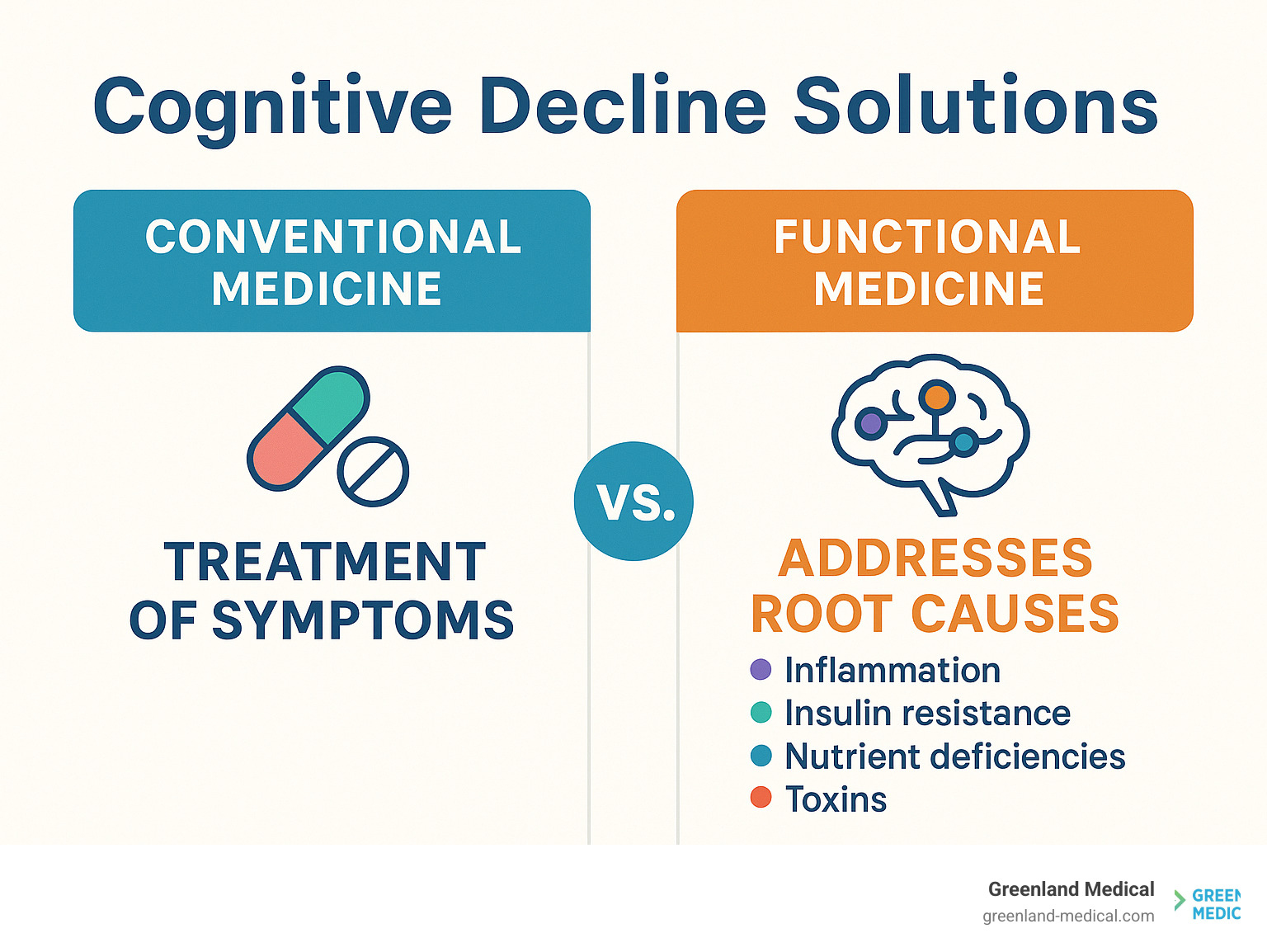
Winning the Battle Against Cognitive Decline: Proven Solutions
Taking Control of Your Brain Health

Cognitive decline solutions are evidence-based approaches that can help prevent, slow, or even reverse memory loss and thinking problems. If you're concerned about brain health, here's what current research shows works best:
Solution Type Key Interventions Effectiveness Lifestyle Regular exercise (150+ mins/week), MIND diet, 7-8 hours sleep, stress management Strong evidence for prevention and slowing progression Medical Blood pressure control, medication review, treating depression and sleep apnea Proven to reduce risk and manage symptoms Functional Personalized protocols (like ReCODE), targeted supplements, neurofeedback Emerging evidence for reversal in early stages Social Regular social engagement, continued learning, community involvement Builds cognitive reserve and resilience
Memory lapses happen to everyone, but when they become frequent or disruptive, it's time to take action. The good news? Research increasingly shows that cognitive decline isn't inevitable. From the FINGER trial to the ReCODE Protocol, studies demonstrate that personalized, multi-domain approaches can make a significant difference—even for those with genetic risk factors like APOE4.
The key is early intervention. Most people have Alzheimer's disease for 20-30 years before diagnosis, which is precisely when preventive strategies are most effective. This means the choices you make today could determine your cognitive health decades from now.
I'm Dr. Andrew Greenland, a dual-trained medical doctor and Certified Functional Medicine Practitioner specializing in cognitive decline solutions that address root causes rather than just symptoms. At Greenland Medical, we combine advanced diagnostics with personalized lifestyle medicine to help patients restore brain function and prevent further decline.

Understanding Cognitive Decline: From Normal Aging to Dementia

Think of cognitive health as a journey rather than a destination. We all travel along this path as we age, but we don't all take the same route or move at the same pace. Understanding where you or someone you care about stands on this journey is the first step toward finding effective Cognitive Decline Solutions.
As we grow older, our risk of experiencing cognitive changes increases. The numbers tell an important story: mild cognitive impairment (MCI) affects about 8% of folks between 65-69 years old. This percentage climbs steadily with age – reaching 15% for those 75-79, 25% for the 80-84 age group, and 37% for people 85 and beyond. These aren't just statistics; they're a reminder that taking care of our brain health becomes increasingly important with each passing year.
Our genes can influence our cognitive journey too. The APOE gene, especially the APOE4 variant, is currently the strongest known genetic risk factor for Alzheimer's disease. If you have one copy of APOE4 (about a quarter of us do), your lifetime risk of developing Alzheimer's sits around 30%. With two copies, that risk jumps to over 50%. But here's the hopeful part – your lifestyle choices can significantly modify these genetic predispositions. Your genes may load the gun, but your lifestyle choices determine whether it fires.
Normal Aging vs Mild Cognitive Impairment
We all have those moments – walking into a room and forgetting why, misplacing our keys, or drawing a blank on a neighbor's name. That's normal aging. These occasional memory hiccups don't typically interfere with daily life. You might take longer to learn new information, but you can still do it. The memory usually comes back later, and life goes on without much disruption.
Mild cognitive impairment (MCI) is different. It's like crossing a threshold where the changes become more noticeable and consistent. With MCI, you might find yourself:
Forgetting important appointments or conversations more frequently Having family members who notice the changes before you do Finding certain tasks more challenging than before, though you can still manage independently Wondering if these changes are progressing over time
At Greenland Medical, we see MCI not as a final diagnosis but as a crucial intervention point. It's a window of opportunity where targeted Cognitive Decline Solutions can make a meaningful difference before more significant problems develop.
Stages of Cognitive Decline
Understanding where you are on the cognitive continuum helps determine the most effective approach:
No Cognitive Impairment: This is your brain functioning normally, with only occasional forgetfulness that we all experience. You're able to learn, and manage complex tasks without significant difficulty.
Subjective Cognitive Decline (SCD): At this stage, you might notice your memory or thinking isn't quite what it used to be, even though standard tests show normal performance. Many people dismiss these feelings, but research shows they're often early warning signs. Listen to your intuition here – it might be telling you something important.
Mild Cognitive Impairment (MCI): Now we're seeing measurable changes in memory or thinking skills that go beyond normal aging but don't significantly impact daily life. You might need to use more reminders or systems to stay organized, but you're still managing independently. This stage is incredibly responsive to both conventional and functional medicine approaches.
Dementia: At this point, cognitive decline affects multiple areas of brain function and interferes with daily activities. Alzheimer's disease is the most common form, but vascular dementia, Lewy body dementia, and other types each have their own patterns and challenges.
Comparison Mild Cognitive Impairment Dementia Memory Noticeable memory lapses Significant memory loss Daily Function Minimal impact on daily tasks Interferes with independence Complexity Usually affects one cognitive domain Affects multiple cognitive domains Recognition Person often aware of difficulties May have limited awareness of deficits Progression May remain stable or improve with intervention Typically progressive
At Greenland Medical, we believe in meeting you wherever you are on this journey. We carefully assess your current cognitive status and design personalized Cognitive Decline Solutions that address your specific needs. Our experience shows that early intervention yields the best results, but meaningful improvements are possible at every stage with the right approach.
Spotting the Warning Signs and Getting a Diagnosis
We all forget things sometimes—where we put our keys or the name of that actor in the movie we saw last week. But when does normal forgetfulness cross the line into something we should pay attention to?
Think of your brain as sending you little signals when something's not quite right. These might include:
Repeatedly forgetting important dates or information you just learned. You might notice yourself asking the same questions over and over, or family members giving you that "we just talked about this" look.
Finding yourself stuck mid-sentence, searching for common words that used to come easily. Or maybe you're having trouble following along in group conversations that never bothered you before.
When you misplace something, you can't mentally retrace your steps to find it. Your glasses aren't just "somewhere in the house"—they seem to have vanished completely.
Feeling disoriented about time (what day is it?) or place (how did I get here?). This goes beyond the occasional "what day is it?" moment we all have.
Family and friends often spot these changes before we do. If someone who knows you well expresses concern, try to listen with an open mind rather than dismissing it. Research clearly shows that addressing risk factors like high blood pressure in midlife significantly reduces cognitive decline risk later on.
When to Seek Help
Trust your instincts—if something feels off with your thinking or memory, it's worth checking out. Consider making an appointment when:
Your memory issues start getting in the way of everyday life. Maybe you're missing appointments or struggling with tasks that used to be second nature.
You find yourself increasingly reliant on notes, reminders, or family members to keep track of important information.
Managing money becomes confusing—bills go unpaid or you make unusual financial decisions.
You get turned around in familiar neighborhoods or stores.
Memory concerns are causing anxiety, depression, or withdrawal from activities you enjoy.
Driving safety deserves special attention. If you find yourself getting confused behind the wheel or having near-misses, it's time for an honest assessment. In the UK, you're legally required to notify the DVLA (in England and Wales) or DVA (in Northern Ireland) about any condition that might affect your driving ability. This isn't about taking away independence—it's about keeping everyone safe while exploring alternatives.
Key Tests and Assessments
When you see a doctor about memory concerns, they'll typically start with some straightforward evaluations:
Cognitive screening tests like the Montreal Cognitive Assessment (MoCA) or Mini-Mental State Examination (MMSE) are quick, 10-minute assessments that can detect subtle changes in thinking skills. These aren't pass-fail tests, but rather tools to help determine if further evaluation makes sense.
Neuropsychological testing digs deeper, examining specific areas like memory, attention, problem-solving, and language. These more comprehensive assessments help distinguish between normal aging, MCI, and dementia.
Brain imaging helps rule out other causes of cognitive symptoms. An MRI shows your brain's structure, potentially identifying issues like small strokes or tumors, while PET scans can detect protein deposits associated with Alzheimer's disease.
Laboratory tests check for treatable conditions that can affect thinking—vitamin deficiencies (especially B12), thyroid problems, infections, and more. Some specialized tests can measure Alzheimer's biomarkers in spinal fluid.
Your doctor will also review your medical history, medications, and lifestyle factors that might contribute to cognitive symptoms. Many medications can affect thinking, and conditions like sleep apnea or depression can mimic cognitive decline.
At Greenland Medical, our approach to diagnosis goes beyond checking boxes. We look for the underlying causes of cognitive changes—inflammation, hormonal imbalances, metabolic issues, and environmental factors that standard testing might miss. Our goal isn't just to name the problem but to find the solution.
Getting a proper evaluation isn't about confirming fears—it's about opening doors to effective Cognitive Decline Solutions that can make a real difference in your brain health and quality of life.
Top Evidence-Based Cognitive Decline Solutions

When it comes to protecting your brain, research shows that taking a "one-and-done" approach simply doesn't cut it. The most effective cognitive decline solutions combine multiple strategies that work together—like pieces of a puzzle creating a complete picture of brain health.
Think of the landmark FINGER trial as a breakthrough moment for brain health. This study showed something remarkable: when people combined healthy eating, regular exercise, brain training, and heart health management, they maintained sharper thinking skills than those who didn't. Similarly, the ACTIVE trial tracked people for a full decade and found that specific training in reasoning and processing speed helped people stay mentally sharper than those who received no training or even memory-focused exercises.
Perhaps most exciting is the ReCODE Protocol, which has shown an impressive 84% success rate in not just slowing but actually reversing cognitive decline in people experiencing everything from mild memory concerns to early Alzheimer's. The key? It doesn't just mask symptoms—it digs deep to address what's causing the problem in the first place.
Lifestyle Cognitive Decline Solutions
The foundation of any effective brain health plan starts with how you live day to day:
Your body craves movement, and your brain does too. Research confirms that regular exercise works like fertilizer for your brain, increasing blood flow and stimulating production of BDNF—often called "miracle grow" for brain cells. Aim for 150 minutes of heart-pumping activity weekly, plus some strength training. What's fascinating is that exercise can actually increase the size of your hippocampus, the memory center that typically shrinks with age.
What you eat directly impacts brain function. The MIND diet combines the best brain-friendly elements of Mediterranean and DASH eating patterns. Fill your plate with colorful vegetables (especially leafy greens), berries (nature's brain candy), nuts, olive oil, whole grains, beans, and fish. Cut back on red meat, butter, processed foods, and sweets. This isn't about perfection—even moderate adherence to this pattern shows benefits.
Sleep isn't a luxury—it's when your brain cleans house. During deep sleep, your brain activates its waste removal system, clearing away harmful proteins like amyloid beta. Aim for 7-8 hours of quality sleep by creating a consistent bedtime routine, keeping your bedroom cool and dark, and putting electronic devices away at least an hour before bed.
Chronic stress is toxic to your brain, particularly the hippocampus. Finding ways to manage stress—whether through meditation, deep breathing exercises, yoga, or simply walking in nature (forest bathing)—isn't just about feeling better emotionally. It's about protecting your brain's physical structure and function.
Humans are social creatures by design, and meaningful connections with others build cognitive reserve—your brain's resilience against decline. Regular social engagement, whether volunteering, joining clubs, or simply maintaining close relationships, creates a protective effect that isolated individuals miss out on.
At Greenland Medical, we know these lifestyle changes can feel overwhelming. That's why we help you implement them gradually, in ways that fit your unique life and preferences. Small, consistent changes add up to significant brain protection over time.
Medical & Pharmaceutical Cognitive Decline Solutions
Medical approaches play a crucial role in comprehensive brain care:
Blood pressure control deserves special attention. The SPRINT MIND study revealed something powerful: when people lowered their systolic blood pressure to less than 120 mmHg, they significantly reduced their risk of developing cognitive problems. This highlights the profound connection between heart health and brain health—they're truly inseparable.
Many common medications can silently impair thinking skills. Benzodiazepines, certain antihistamines, opioids, some acid reducers, and various sleep medications can all affect cognition, especially in older adults. A thorough medication review might reveal that what's helping one condition could be harming your cognitive function.
For those diagnosed with MCI due to Alzheimer's disease, newer treatments like lecanemab (Leqembi) and donanemab (Kisunla) target the amyloid plaques characteristic of the disease. These treatments require regular infusions and careful monitoring for side effects like brain swelling. For more advanced cases, medications like cholinesterase inhibitors may provide symptomatic relief, though they don't address underlying causes.
Don't overlook the importance of treating conditions that affect brain health. Depression, diabetes, and sleep apnea all take a toll on cognition when left untreated. Sleep apnea alone increases dementia risk by 26%, yet effective treatment can restore cognitive function.
Alternative & Functional Cognitive Decline Solutions
At Greenland Medical, we specialize in uncovering and addressing the root causes of cognitive decline:
The Bredesen Protocol represents a paradigm shift in how we view conditions like Alzheimer's. Rather than seeing it as a single disease, this approach recognizes it as the brain's protective response to various "insults"—inflammation, insulin resistance, nutritional deficiencies, toxin exposure, and more. By identifying which subtypes are affecting you, we can create targeted interventions that address your specific needs.
Your genes aren't your destiny, but they do offer valuable clues about your brain health. Personalized genomics helps us identify your specific risk factors and tailor interventions accordingly. For example, if you carry the APOE4 gene (associated with increased Alzheimer's risk), you might benefit from different dietary approaches than someone without this variant. We analyze 30 genes related to cognitive function to create truly personalized cognitive decline solutions.
Neurofeedback offers a fascinating way to improve brain function. This technology monitors your brain activity in real time and provides immediate feedback, helping you learn to self-regulate your brainwaves. It's like physical therapy for your brain, strengthening neural pathways and improving cognitive performance.
Cognitive training exercises specific mental skills—like reasoning, processing speed, and memory—building your brain's resilience against decline. The ACTIVE trial showed these targeted exercises provide benefits that last for years, especially when practiced consistently.
Strategic nutritional support can address deficiencies that affect brain function. Omega-3 fatty acids (particularly DHA), B vitamins, vitamin D, and magnesium all play crucial roles in brain health. For some, medical foods like CerefolinNAC, which contains specialized forms of B vitamins and antioxidants, provide targeted support for brain metabolism.

Safeguarding Your Brain: Heart, Mind & Community

Your brain doesn't exist in isolation—it's deeply connected to your heart health, emotional wellbeing, and social connections. When we talk about Cognitive Decline Solutions at Greenland Medical, we're looking at the whole picture of your health, not just what's happening above the neck.
Managing Comorbidities
Think of your brain as a sensitive instrument that performs best when the entire orchestra of your body is in harmony. Several common health conditions can throw this harmony off balance.
Hypertension silently damages the delicate blood vessels in your brain over time. Like rivers gradually eroding their banks, high blood pressure wears away at vessel integrity, potentially leading to vascular dementia. The good news? Managing your blood pressure, especially during your 40s-60s, significantly shields your brain later in life. Many of our patients are surprised to learn that something as simple as consistent blood pressure control can be one of the most powerful Cognitive Decline Solutions available.
Living with diabetes means your brain is often working in a challenging environment. Insulin resistance and liftd blood sugar create a perfect storm of inflammation, oxidative stress, and vascular damage. People with type 2 diabetes face a 60% higher risk of developing dementia—a statistic we take seriously at Greenland Medical. We work with patients to optimize blood sugar through personalized nutrition plans, targeted exercise, and medication when necessary.
Carrying extra weight, especially around your middle, doesn't just affect your physical mobility—it impacts your brain too. Obesity triggers inflammatory pathways throughout the body that can reach the brain, while also disrupting the delicate balance of hormones that support cognitive health. Many patients find that addressing weight issues leads to noticeable improvements in mental clarity and focus.
The relationship between depression and cognitive health works both ways—each can trigger or worsen the other. Rather than simply prescribing an antidepressant, we dig deeper to identify potential root causes like chronic inflammation, nutrient deficiencies, or hormonal imbalances. Addressing these underlying issues often improves both mood and cognition simultaneously.
The quality of your sleep directly impacts your brain's ability to clear waste products and consolidate memories. Sleep disorders like sleep apnea can be particularly damaging, as they repeatedly deprive the brain of oxygen throughout the night. If you often feel tired during the day despite sleeping enough hours, or if your partner notices loud snoring or breathing pauses, a sleep assessment should be part of your cognitive health workup.
Building Cognitive Reserve
I love explaining cognitive reserve to my patients as being like a savings account for your brain. The more you deposit throughout life, the more you can withdraw when needed. Even if your brain experiences changes associated with aging or disease, a robust cognitive reserve allows you to maintain function longer.
Lifelong learning creates new neural pathways and strengthens existing ones. Your brain thrives on novelty and challenge. One fascinating study showed that older adults who learned complex new skills like quilting or digital photography experienced more memory improvement than those who simply socialized. At Greenland Medical, we encourage patients to pursue learning that genuinely interests them—whether that's studying a new language, mastering a musical instrument, or diving into history books.
There's something deeply fulfilling about giving back to your community, and it turns out it's good for your brain too. Volunteering and community engagement provide a triple benefit: purposeful activity, social connection, and cognitive stimulation. Research from the Health and Retirement Study confirms that staying socially engaged, particularly through volunteering, correlates with better cognitive health as we age.
The arts engage multiple brain regions simultaneously in a beautiful neural symphony. Creative pursuits like painting, writing, playing music, or dancing aren't just enjoyable—they're powerful Cognitive Decline Solutions that build cognitive flexibility. Even for those already experiencing memory changes, artistic expression can improve quality of life and communication abilities.
For those already navigating cognitive challenges, technology can serve as a valuable support system. Smartphone reminders, GPS navigation, medication management apps, and voice assistants can help maintain independence and reduce stress. At Greenland Medical, we often help families set up digital calendars with shared access, allowing loved ones to provide support while respecting autonomy.
Our approach at Greenland Medical centers on personalized strategies that build brain resilience while addressing underlying health conditions. We recognize that the most effective Cognitive Decline Solutions accept the whole person—body, mind, and social connections. Whether you're visiting us in London, Richmond, or Twickenham, we're committed to helping you protect your most precious asset: your brain health.
Frequently Asked Questions about Cognitive Decline Solutions
What is the difference between normal aging and MCI?
"I keep forgetting where I put my glasses... is this normal aging or should I be worried?"
This is one of the most common questions we hear at Greenland Medical. The truth is, there's a meaningful difference between those everyday "senior moments" and something that might need medical attention.
With normal aging, you might occasionally forget a name or misplace your keys, but you'll usually remember later. You may need a bit more time to learn new information, but you absolutely can still learn new skills and retain them. These changes don't significantly disrupt your daily routine.
Mild Cognitive Impairment (MCI) crosses an important threshold. The memory lapses become more frequent and noticeable. Your family might start commenting on changes they've observed. You might struggle with more complex tasks like balancing your chequebook or following a complicated recipe. The key distinction is that with MCI, these challenges are noticeable but don't yet severely impact your independence - you can still manage daily activities.
Our team uses standardized assessments to help determine where you fall on this spectrum, allowing us to recommend the most appropriate Cognitive Decline Solutions for your specific situation.
Can cognitive decline be reversed or only slowed?
This question touches on what gives many of our patients hope. The answer isn't black and white - it depends on several factors including the underlying cause, how early we catch it, and individual health factors.
The encouraging news is that research increasingly supports the possibility of improvement, not just slowing decline. The ReCODE Protocol, which we implement at Greenland Medical, reports an impressive 84% success rate in preventing and reversing cognitive decline in people with early symptoms when properly followed.
Many types of cognitive issues can be completely reversed when we address the root cause. For example, if your memory problems stem from medication side effects, vitamin deficiencies, poor sleep, or depression, treating these underlying factors can restore cognitive function.
Even in more advanced cases, we've seen patients make remarkable progress with personalized, comprehensive Cognitive Decline Solutions. One of our patients, a 72-year-old retired teacher, improved her cognitive assessment scores by 30% after six months on our protocol that addressed her previously undiagnosed sleep apnea, vitamin B12 deficiency, and chronic inflammation.
The key is early intervention and addressing the whole person, not just the symptoms.
Are brain-training apps worth the time and money?
"Should I spend 20 minutes a day on brain games, or is there a better way to keep my mind sharp?"
The evidence on commercial brain-training apps gives us a nuanced picture. Most research suggests these games primarily make you better at... playing those specific games. The skills don't necessarily transfer to real-world cognitive abilities or daily functioning.
That said, certain structured cognitive training programs have shown promising results. The ACTIVE study demonstrated that specific training in reasoning and processing speed provided genuine long-term benefits for older adults. But these were evidence-based programs, not typical app-store games.
At Greenland Medical, we recommend a more holistic approach to brain stimulation:
Learn something truly new that challenges different aspects of cognition. Taking up a language, musical instrument, or complex craft engages multiple brain regions simultaneously and builds cognitive reserve more effectively than repetitive games.
Combine mental and physical exercise for a synergistic effect. A dance class, for instance, challenges both your mind and body while adding social engagement—a triple benefit for brain health.
Address underlying health factors that might be limiting your cognitive performance. The most effective brain-training app won't help much if uncontrolled blood pressure or poor sleep quality is affecting your brain function.
One of our patients, an avid crossword puzzler, was disappointed when her daily puzzles didn't seem to protect her from memory issues. After we identified and treated her underlying insulin resistance and sleep apnea, she not only experienced cognitive improvement but found her puzzles more enjoyable again.
The bottom line? Instead of relying solely on brain-training apps, invest your time in comprehensive Cognitive Decline Solutions that address all aspects of brain health.
Conclusion
The journey to better brain health is as unique as you are, but science gives us plenty of reasons to be hopeful. Effective cognitive decline solutions aren't just theoretical—they're making real differences in people's lives every day. Whether it's making thoughtful lifestyle changes, exploring medical treatments, or diving into functional medicine approaches, we now have more tools than ever to protect and even restore our precious cognitive abilities.
What have we learned through this guide? A few things stand out:
Early action gives you the best chance for success. Just like saving for retirement, the sooner you start implementing cognitive decline solutions, the greater your cognitive "nest egg" will be. Don't wait for significant symptoms to appear—the time to nurture your brain health is now.
Multiple approaches work better together. Exercise alone helps, but exercise combined with brain-healthy nutrition, stress management, social connections, and targeted treatments? That's when the magic happens. These elements support each other, creating benefits greater than the sum of their parts.
Looking beneath the surface matters enormously. Treating symptoms might bring temporary relief, but addressing the underlying causes of cognitive change leads to deeper, more lasting improvements. This is where functional medicine truly shines.
Your brain health plan should be as individual as your fingerprint. Your genetics, health history, lifestyle, and specific cognitive challenges all shape what approach will work best for you. One-size-fits-all solutions rarely deliver optimal results.
At Greenland Medical, we're passionate about creating personalized cognitive decline solutions that address the unique factors affecting your cognitive health. Our approach combines thorough diagnostics with evidence-based interventions, including the Bredesen Protocol, to identify and treat what's really causing cognitive changes—not just mask the symptoms.
With locations in Richmond, Twickenham, and London, our team is here to support you in maintaining or restoring your brain function, regardless of your age or current cognitive status. Whether you've noticed some concerning memory lapses, have dementia in your family history, or simply want to keep your mind sharp as you grow older, we're ready to walk alongside you on this important journey.
Ready to explore what personalized cognitive decline solutions could mean for you or someone you love? Visit our website to learn more about our brain health programs or schedule your consultation today. Remember—your brightest cognitive days might still be ahead.
